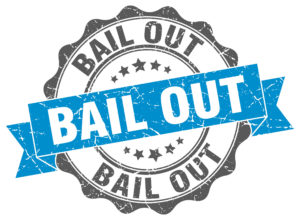
If someone close to you has been arrested and thrown in jail, you probably want to do everything in your power to help get them out of jail. If the jail tells you that a bond amount has been set, you might be considering co-signing a bond if the person in jail is unable to afford the amount. But is it a good decision to co-sign a bail bond, and how can you get your money back after signing it? We answer those questions below.
Co-Signing Bail Bonds
In order to co-sign a bail bond, you must meet certain credit requirements, have a stable job, and have enough money or assets to cover the full bond amount. That’s because when you co-sign a bond, you are responsible for the full amount of money in the event that the arrested individual does not show up for court. In most cases, co-signers are family or close friends of the individual who has been arrested. Because the penalties are severe if they don’t show up for court, only people really close to a suspect should consider co-signing a bail bond.
When you co-sign a bail bond, you are agreeing to pay the full amount of the bond in the event that the defendant fails to show up for court. You don’t need to pay the full bond amount up front, but some places will require a down payment or collateral in the form of assets before allowing you to co-sign a bail bond. It’s also worth noting that you will have to pay some money out of pocket that won’t be returned. For example, if bond is set at $5,000, you can usually co-sign a bail bond and pay 10 percent of the fee to have the person released. You will be out $500, but your loved one will not have to sit in jail until their court date.
When you co-sign a bail bond, you become responsible for that person, and if they don’t show up to court, you may be on the hook for the full $5,000. In the event that you co-sign a bail bond and you suspect that the individual might try to flee, you can contact the bond company and let them know. The bail bondsman will pick up the individual, return them to jail, and cancel the remainder of your contract.
Pros and Cons of Co-Signing A Bail Bond
Co-signing a bail bond has a couple benefits as well as a couple of risks:
Pros – Gets your loved one out of jail. Co-signing also allows you to pay a smaller portion of the total bail amount (typically 10 percent of the bail amount) to get the person released.
Cons – You may have to pay the full amount if the defendant skips court, which could also result in the forfeiture of your collateral. You are assuming the risk.
At the end of the day, the decision to co-sign a bail bond really comes down to how much you trust the person and whether or not you can afford to take the financial hit on the off chance that they do not appear in court. Instead of going straight to the courthouse to bail out a friend, we suggest that you speak to a criminal defense lawyer like Avery Appelman to learn more about the criminal trial process and how you can best assist your friend without necessarily putting your neck on the line. Call us today at (952) 224-2277.





